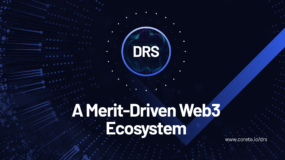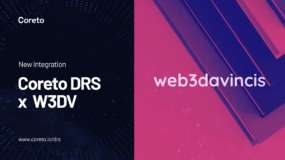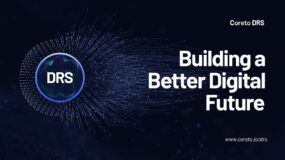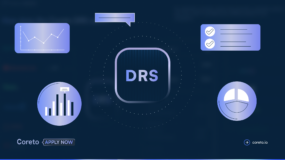- Home
- Platform Features
- A New Era of Trust: Introducin ...
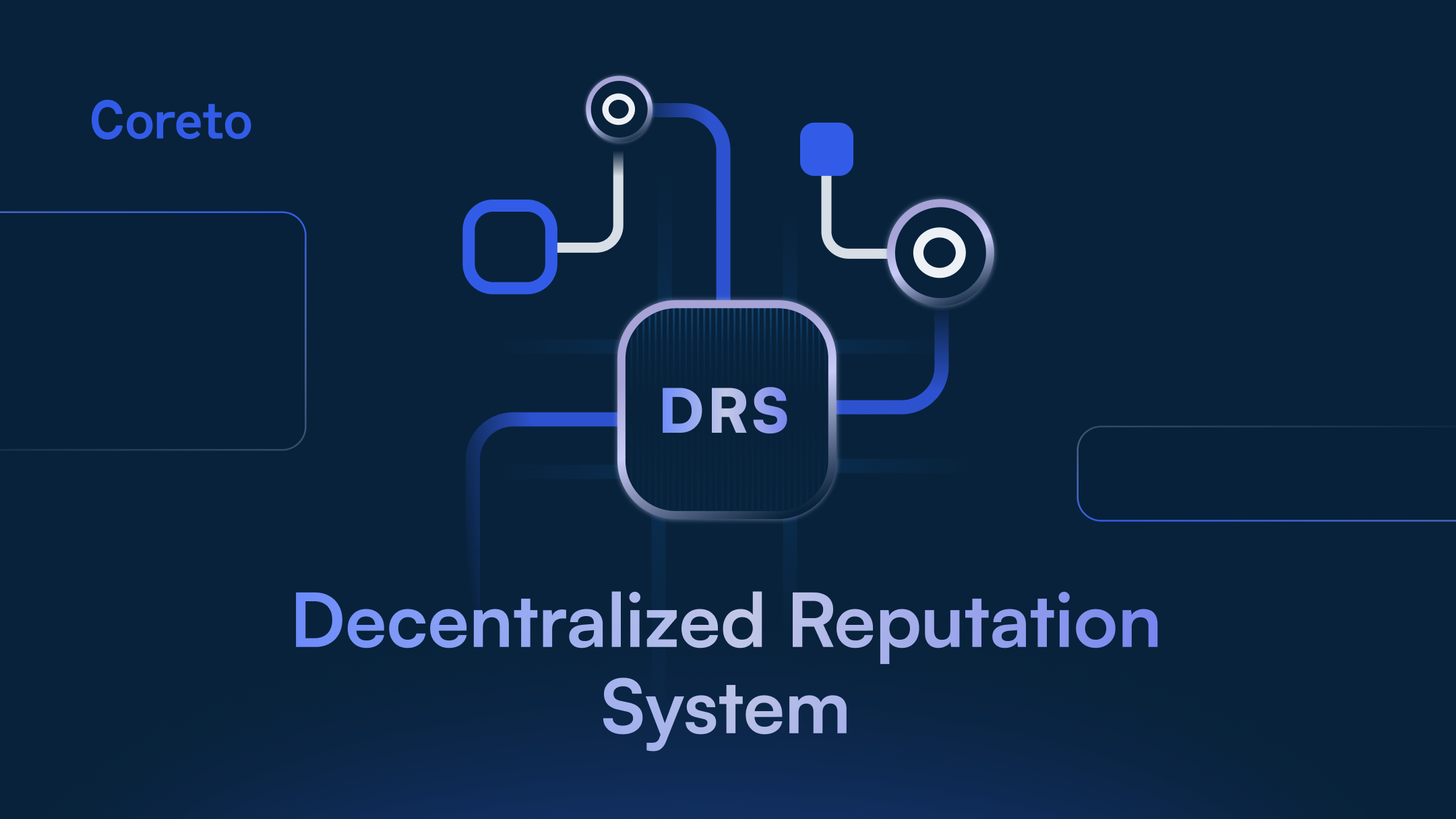
In today’s digital age, online reputation is becoming increasingly important.
With the rise of online marketplaces, social networks, web3 social platforms, DeFi service providers, and so on, individuals and businesses are constantly being evaluated based on their reputation or trustworthiness.
However, traditional reputation systems can be easily manipulated and are often not transparent or tamper-proof. To address these issues, a new type of reputation system is needed: a Decentralized Reputation System.
The Coreto DRS is a generalist decentralized reputation system that can be used across different industries and platforms and aims to create a more comprehensive and accurate view of an individual or entity’s reputation.
In this article, we are going to discuss in detail the Coreto Decentralized Reputation System, why it’s important, who is it for, and how can you, as an online user, benefit from adopting and using DRS-enabled platforms and D/apps, with the end-goal of building an on-chain reputation.
Key Takeaways:
- The Coreto DRS is a decentralized reputation system that uses blockchain technology to provide a secure, transparent, and tamper-proof record of reputation data.
- It has multiple use cases and can be used across various Web2 & Web3 industries and platforms.
- The Coreto DRS allows users to build and track their reputation across multiple platforms, giving them a single reputation score that reflects their trustworthiness and credentials.
- The benefits of using the Coreto DRS include improved accuracy, enhanced privacy, better security, and increased transparency.
- It can also help projects and platforms become more trustworthy, create a safer environment for their users, and lead to a more robust and vibrant online community.
What is a Decentralized Reputation System?
A decentralized reputation system is a system for assessing the reputation or trustworthiness of individuals or entities in a network that is not controlled by a central authority. Instead, the system relies on the collective input of the network to determine reputation scores. This is enabled by blockchain technology, allowing a transparent and tamper-proof record of reputation data to be maintained.
Isn’t it amazing how the internet has changed the way we gather information?
Nowadays, we can easily research products and people online before making a purchase or following someone’s opinions. Online platforms allow us to share ratings and recommend good finds, with many marketplaces having built-in review and rating systems. Whole platforms are also built around showcasing achievements, endorsements, and reviews.
We’ve gotten used to rating systems all around us on the internet, from simple star ratings to percentage scores and everything in between.
These are all forms of tracking reputation. Most of them are based on subjective reviews, and almost none of them can prove that the final score is accurate or reliable and that there is no manipulation going on behind the scenes.
In such systems, it’s hard to know if the reviews and ratings are trustworthy, if the scoring is accurate or relevant, or if someone’s reputation isn’t tampered with to serve the interests of some party or another.
So, what can be done when traditional reputation systems fail to be trustworthy themselves?
The solution: blockchain technology – transparent, accurate, immutable!
A decentralized reputation system, which uses blockchain technology, would make sure that everyone has a unique digital identity and that reputation data is accurate and reliable. This way, we can trust the reviews and scores, and the whole ecosystem can thrive using the reputation system.
Decentralized reputation systems are needed because traditional online systems can be easily manipulated by individuals or entities with bad intentions. They can create fake reviews, manipulate ratings, and use other tactics to deceive consumers and undermine the trust in the system.
A decentralized reputation system that is enabled by blockchain technology can help to address these issues by providing a transparent and tamper-proof record of reputation data. This can ensure that all users have unique digital identities and that reputation data is accurate and reliable. By using a decentralized system, it becomes much harder for bad actors to manipulate the system and deceive users.
Additionally, a decentralized reputation system also allows for more privacy, as users can have more control over their personal data and who can access it, unlike centralized systems where data is owned and controlled by a single entity.
Defining Reputation: Trust & Performance
When evaluating someone’s reputation, both subjective and objective assessments are needed. Subjective assessments come from our own interactions with the person and the interactions they had with others. Objective assessments are quantifiable, data-based results of the person’s efforts.
In other words, we assess Reputation based on Trust and past Performance.
This is something that we do in our daily lives all the time without even realizing it. It’s part of how we are built as social individuals and it’s part of how human society was built.
And this is how the Coreto DRS is built: A system that evaluates an individual or entity’s reputation using both trustworthiness and performance as criteria. This system is designed to create a more comprehensive and accurate view of their standing.
The data can be collected from a variety of sources, including social media interactions, online reviews, feedback from other users, and performance metrics such as on-time delivery, customer satisfaction, completion rate, etc. The data is then stored on a decentralized ledger, which allows for a transparent and tamper-proof record of reputation data to be maintained.
The reputation system then uses this data to create a score for each individual or entity in the network. The reputation score is a composite score that is calculated using a combination of Trust and Performance metrics.
This type of reputation system can have multiple use cases, in both web2 & web3 contexts, such as Marketplaces, Reviewing platforms, Lending platforms, Social networks, Online gaming, or Trading platforms
Here are just five ways the Coreto DRS can help different industries:
Gaming Industry – In the gaming industry, having a trustworthy reputation is crucial to building trust among players. The Coreto DRS in the gaming industry is meant to act as a digital reputation system, where players can accumulate reputation points based on their behavior and performance in various games. This system could also help prevent cheating and increase fairness in the gaming environment.
As the Coreto DRS is “portable”, game developers can attract new users by providing cross-game benefits to those that have their DRS enabled within their DID.
E-Commerce Industry – In the e-commerce industry, the Coreto DRS can help establish trust between buyers and sellers. A decentralized reputation system can keep track of a seller’s history of successful transactions, delivery time, and product quality, which buyers can use to determine whether or not to do business with them.
DeFi – In the DeFi sector, having a reliable reputation system can be the differentiator factor. The list of benefits and applications is endless, but as a simple example, we can consider that the Coreto DRS can act as a credit risk score generator for the DeFi space by providing users with a reliable and tamper-resistant way to store and access their credit history. This allows users to showcase their creditworthiness and track their credit scores over time. Additionally, it can provide lenders with a more accurate and transparent way to assess the risk associated with lending to specific borrowers, as they can access their credit history and track their credit scores. This can help to reduce information asymmetry and lead to more efficient pricing and better outcomes for lenders and borrowers.
Social Media Platforms – In the world of social media, the Coreto DRS is designed to help create a more trustworthy environment for users. The Coreto DRS helps users accumulate reputation points based on their behavior on the platform, such as their engagement with others, the quality of their content, or the frequency of their posts. This improves the overall quality of the platform, making it a more enjoyable and trustworthy place for users.
Sharing Economy Platforms – In the sharing economy, trust is key to building a successful business. For example, in a car-sharing app, a user’s reputation could be based on their driving behavior, the condition of the car after they use it, and the timeliness of their return. This could help attract more customers and improve the overall experience of the platform or App.
The end goal is to use a combination of Trust and Performance metrics to create a more comprehensive and accurate view of an individual or entity’s reputation. It can be used in a variety of different contexts and can help to create a more efficient and fair space by rewarding the good and holding the bad accountable.
In order to better understand how the Trust and Performance based scoring of the DRS is used as part of the Coreto Platform, have a look at our Coreto: Trust Score Explained and Coreto: Performance Score Explained articles.
How does the DRS work?
From the very beginning, we wanted the Coreto DRS to be a generalist decentralized reputation system, designed to be applied to a wide range of different use cases and contexts.
The Coreto DRS uses blockchain technology to create a transparent and tamper-proof record of reputation data. This data can be collected from a variety of sources, including social media interactions, online reviews, market data, etc. The reputation system then uses this data to create a reputation score for each individual or entity in the network.
Another goal for the system was to enable interoperability across different platforms and services, which would make it easier for users to establish and maintain their reputation across the internet.
In order to have the flexibility of building and tracking the reputation on multiple platforms, positioned in different industries, and having different KPIs for what Trust and Performance mean for each case, we ended up with three main components:
- the Reputation Collection Service (RCS) – converting user actions into Trust and Performance points, based on predefined KPIs;
- the Decentralized Reputation Tracker (DRT) – receiving and storing the Trust and Performance points collected by the RCS on-chain, providing an immutable history of each user’s evolution over time;
- the Reputation Scoring Service (RSS) – converting the on-chain Trust and Performance history stored by the DRT into the final Reputation scores for each individual, using our unique Trust and Performance algorithms.
Together with our Coreto Decentralized ID (DID), these three main components are what we call the Coreto Decentralized Reputation System.
The Reputation Collection Service (RCS)
The first piece of the puzzle is called the Reputation Collection Service (RCS). As the first component of the DRS, it handles collecting Trust and Performance data by linking to relevant actions, events, and data feeds from the platforms that integrated the system.
The role of the RCS is crucial as it provides the data that is used to calculate the reputation scores. The accuracy and reliability of the data directly impact the credibility of the reputation score. It also has to be flexible enough that it can be linked to any relevant KPIs inside the said platforms.
The Coreto RCS is designed as a set of developer tools and APIs that allow for:
- defining clear rules for converting actions, events, and data from inside a system into Trust and Performance points
- validating and enforcing these rules
- structuring the resulting data in the correct format
- submitting the validated and structured Trust and Performance data to the rest of the Decentralized Reputation System
The first tools we built were meant to serve our own Coreto Platform, and are actively being used as part of our own integration of the DRS. This has helped us to experiment and adjust, and identify the best ways to also make them available for other platforms as well.
We are now working on expanding and growing the SDK offering for popular programming languages out there, as well as preparing the RCS for the next stage of evolution – one of a more decentralized future!
The Decentralized Reputation Tracker (DRT)
When describing what any decentralized reputation system would look like, we mentioned that one very important thing that any DRS would need is a decentralized ledger that should record and store historical reputation data, typically built using blockchain technology.
This would ensure that the system is transparent, tamper-proof, and reliable. It is a critical component in proving to anyone using it that the system is free from the problems and uncertainties of traditional reputation systems.
This is why we have developed the Decentralized Reputation Tracker as a smart contract on the NEAR Protocol blockchain, that is recording all the historical reputation data on-chain, allowing for a clear record of Trust and Performance points history to be maintained.
The NEAR protocol is a sharded, proof-of-stake, layer-one blockchain that is simple to use, secure, and extremely scalable. We chose NEAR as the underlying blockchain technology for many reasons, the most important being:
- good speed
- scalability at the core level
- great security
- low fees
- developer friendly (using RUST for smart contracts is great!)
- and a growing ecosystem.
Going back to the Decentralized Reputation Tracker, we first launched the initial Testnet smart contract on the NEAR Testnet in August 2022, quickly followed by the Mainnet launch in September 2022.
Since then, the Coreto Platform users have had the option to connect their NEAR wallets to the platform, and have their reputation history tracked on-chain.
But reading data directly from the blockchain is no easy task for regular users wanting to easily understand if someone has a good reputation or not. There needs to be a way to compile all this historical reputation data into an easy-to-understand summary that anyone can understand at a glance.
Enter the Reputation Scoring Service!
The Reputation Scoring Service (RSS)
After having a way to collect reputation points and store them reliably on the blockchain, we still need a way to make sense of it.
We need an algorithm that can process all the recorded reputation data and interpret it as a simple Trust and Performance score.
We need the Reputation Scoring Service!
The Coreto RSS is a custom built algorithm that takes the full recorded history of a user or entity’s Trust and Performance points and applies a set of mathematical formulas in order to calculate an up-to-date score for Trust and Performance.
The algorithm takes into account all recorded data points, as well as the moment each one was recorded. It then calculates a time-weighted score ranging between 0 – 100, where recent data has a greater weight in the overall score than older data, and the entire historical data contributes to the final score.
Since data can come from multiple sources and can be related to multiple different types of activity, the RSS can provide both platform & activity-specific scores, as well as an overall score that encompasses that user or entity’s overall online Reputation.
It can also filter the records by activity types and provide even more insight into where each user’s reputation comes from, highlighting the type of contributions that the user has built their reputation on.
This allows for any user or entity to have a decentralized “proof-of-reputation”, based on verifiable data and a proven track record.
How can the Coreto DRS Help?
The internet has revolutionized the way we communicate, trade, and interact with each other. However, with the rise of online activities, there’s an increasing need for trust and security in our online dealings. That’s where our Decentralized Reputation System (DRS) comes in.
So far we’ve talked about what the Coreto DRS is, how it’s built, and how it functions. But why should you care? What are the benefits of tracking reputation online and why is the Coreto DRS the best tool for the job?
As mentioned at the beginning of the article, we’re using reputation tracking systems throughout the internet all the time. From movie reviews to social media likes and follows, all the way to professional endorsements and achievements.
Our online reputation has become an important part of how we interact in our online activity, and it can even have a significant impact on our offline lives – both personal and professional.
But our traditional online reputation is fragmented, scattered across a myriad of isolated platforms. Our reputation data is controlled by opaque systems, owned by corporations and can become a real challenge to keep track of, maintain, and properly showcase it to others.
The Coreto DRS allows its users to build and track their reputation across a variety of different platforms and use cases, unlocking a whole new set of benefits that traditional systems would find almost impossible to achieve:
- Flexibility: the system provides users with a flexible way to build and track their reputation across multiple platforms and use cases. This allows them to have a single reputation score that reflects their trustworthiness and credibility across a wide range of online interactions, having a reputation that is recognized across multiple platforms and communities, giving them more visibility and exposure.
- Portability: it allows users “to take” their reputation with them wherever they go. This means that users can use it to prove their credibility on different platforms, making it easier to establish trust with new partners and communities, showcasing their skills, expertise, and accomplishments. This can help users to identify and pursue new opportunities that align with their interests and abilities.
- Improved accuracy: the Coreto DRS provides users with a more accurate and comprehensive representation of their reputation by aggregating data from a variety of sources. Allowing them to build a more nuanced and complete picture of their reputation, which can be more useful for decision-making and risk assessment.
- Enhanced privacy: users are in control of their personal information. This enhances privacy and reduces the risk of sensitive information being misused or shared without consent.
- Better security: being built on blockchain technology, the DRS provides users with a secure and tamper-resistant way to store their reputation data. This ensures that a user’s reputation score is accurate and cannot be manipulated, giving users a greater sense of trust and reliability in the system. Furthermore, this provides stability and protection to the system as a whole, ensuring that users can trust in the accuracy of their reputation score.
- Increased transparency: the system provides users with greater transparency and visibility into the data and algorithms used to calculate their reputation score. This makes it easier for users to understand how their reputation is being assessed.
Helping Users
The Coreto DRS allows users to have a decentralized resume of their reputation, be it as gamers, traders, or online personas.
With the Coreto DRS, users can showcase their credibility, reliability, and trustworthiness to others in the online world. This digital resume can be a valuable asset for users to gain the trust of others and build a positive online reputation.
Improving Projects/Platforms
The Coreto DRS can help projects and platforms become more trustworthy for their users. By incorporating the Coreto DRS as a cognitive layer of any online presence, platforms can ensure that their users are who they say they are, reducing the risk of fraudulent activities. The Coreto DRS is meant to help in creating a safer environment for users to interact and transact with each other, leading to more engagement and growth for the platform.
Enhancing the Internet as a Whole
The whole internet, and especially #Web3, can be more trustworthy with the help of the Coreto DRS. By implementing it across different platforms, we can create a safer, more secure online environment where users can feel confident in their interactions and transactions. The Coreto DRS can help reduce the risk of fraud, build trust between users, and promote positive online behavior. This, in return, can lead to a more robust and vibrant internet community, where users can freely interact and collaborate with each other.
Closing thoughts & conclusions
The Coreto DRS can help in many ways to enhance the online experience for users, projects/platforms, and the internet as a whole. By promoting trust, security, and reliability, the Coreto DRS is designed to create a safer, more secure online environment, making the internet a better place for everyone.
Decentralized Reputation Systems (DRS) are revolutionizing the way we evaluate and trust individuals, projects, and platforms on the internet. They are designed to be transparent and secure, with their data stored on a blockchain network, making it impossible to alter or manipulate.
By allowing individuals, projects, and platforms to accumulate reputation points based on their behavior and performance, we can help establish trust, reduce risk, and improve the overall quality of the internet.
With DRS, individuals can have a Web3 digital resume of their online reputation, including their track record as product users, gamers, traders, or online personalities. Leading to a more trustworthy online experience for users.
For businesses, implementing our DRS into their platform or project provides a cognitive layer of trust for their users, making their products stand out in a crowded market.
A more trustworthy internet means a more secure and confident online community.
If you’re a project looking to provide a more secure and trustworthy product for your users, it’s time to learn more about how Coreto DRS can revolutionize your digital experiences. get in touch with us!

